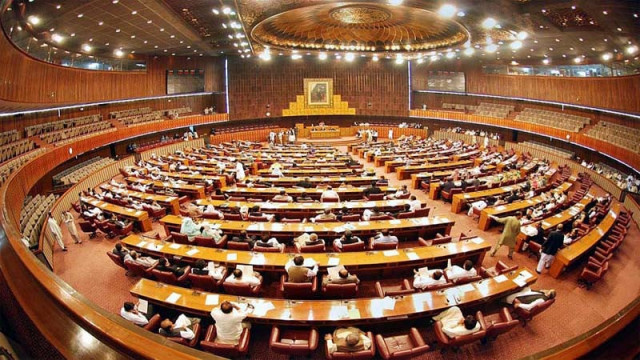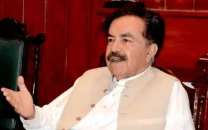Bill on CJ’s suo motu powers sails through NA
Top judge will be barred from suo motu notice in an individual capacity

The National Assembly on Wednesday unanimously passed the Supreme Court (Practice and Procedure), Bill 2023 -- aimed at curbing the top judge’s suo moto powers in an individual capacity.
The House also passed the Lawyers Welfare and Protection Bill, 2023 and the session was adjourned till 12 noon on Thursday (today).
A day earlier, the federal government not only ruled that the chief justice of Pakistan could no longer constitute benches and initiate suo motu proceedings alone but also tabled the same bill in the lower house of parliament to curtail the unbridled powers of the top judge for approval.
Subsequently, NA Speaker Raja Pervaiz Ashraf while referring to the order of the day noted that though the bill related to CJP’s powers had to be passed on Tuesday, the sense of the House suggested that it should be referred to the law and justice committee for further deliberation.
As the NA session began on Wednesday, Speaker Ashraf presided over the session wherein the standing committee’s report on the Supreme Court Practice and Procedure Bill was presented in the House by PML-N MNA Bashir Mehmood Virk.
North Waziristan MNA Mohsin Dawar presented the amendment to the bill that was supported by Federal Law Minister Azam Nazeer Tarar, who had tabled it in the House.
Dawar noted that Karachi's Nasla Tower was demolished because of a suo moto notice, suggesting that the victims of Article 184(3) of the Constitution in the past should be given the right to appeal within 30 days.
The PPP supported Dawar’s amendment, after which it was approved.
Earlier, the Standing Committee on Law and Justice unanimously approved the amendments proposed by the federal cabinet.
The bill suggested that a committee comprising three senior-most judges of the apex court would decide on the suo motu notice, while there would be a right to file an appeal within 30 days of the suo motu decision.
The appeal has to be fixed for hearing within 14 days of filing and after the taking of a suo motu notice, the hearing will be conducted by a three-judge bench, the bill added.
It continued that the decision of the majority in the matter would be acceptable to all.
After the passage of the law, no decision of the SC or high court, or any other legislation would be able to affect it.
Under the additional amendments, the right of appeal would be available in pending cases, while the bench constituted on constitutional as well as legal matters would comprise at least five judges.
Speaking on his bill, Tarar said it was presented in the NA on Tuesday with the aim of making judicial proceedings transparent.
He pointed out that not having the right to appeal in Article 184(3) was against the basic principles of the Constitution and there was no immediate hearing on cases of urgent nature.
He maintained that the rampant use of Article 184(3) started from 2008 to 2010 when a former chief justice started taking suo motu notices.
He added that there should not be a “one-man show” in a suo motu case hearing.
Foreign Minister Bilawal Bhutto-Zardari, who is also the PPP chairman, while addressing the law minister, described the move as “too little and too late”.
He added that it should be called a “judges empowerment” bill.
Tarar acknowledged Bilawal’s “too little, too late” remarks, but said he believed that there was a right time for everything.
“The government demonstrated restraint until a voice came from within the courts,” he added.
The law minister, in response to an issue raised by some circles within the legal fraternity, claimed that there was no need for a constitutional amendment.
“They should go and read the Constitution's Article 191, which empowers parliament to legislate. The Supreme Court also made their rules according to the Constitution and law since 1980 and it is written on the preamble as well,” he added.
He said the country had six bar councils and maintained that all of them saluted the tabling of the bill.
“This bill was a long-standing demand of the bar councils, which said that indiscriminate use of 184(3) should be stopped,” he added.
Speaking in the House after the tabling of the bill, Leader of the Opposition Raja Riaz observed that it would provide justice to the common person, end the one-man show and strengthen the judiciary.
He added that the government and the opposition had jointly brought the bill. He continued that the opposition had considered the bill in detail.
Federal Climate Change Minister Senator Sherry Rehman said the bill was about dividing the powers of individual judges among senior ones.
“The dissenting voice of judges in the courts is in front of everyone,” she added.
Defence Minister Khawaja Asif said that the government had fulfilled all the essentials of legislation and it needed to display its constitutional as well as legal powers.
He continued that the law should have been passed “long ago”.
Jamaat-e-Islami MNA Abdul Akbar Chitrali said Pakistan was facing many problems, emphasising on the importance of strengthening state institutions.
“The Supreme Court or the other [components of the] judiciary are not performing their duties. The judges of the Supreme Court have been taking ‘wrongful’ suo moto notices,” he claimed.
Expressing his views, PTI MNA Saleh Muhammad said the legislation was tantamount to imposing restrictions on an independent judiciary.
“Instead of passing the bill hastily, time should have been given for discussion,” he opined.



















COMMENTS
Comments are moderated and generally will be posted if they are on-topic and not abusive.
For more information, please see our Comments FAQ